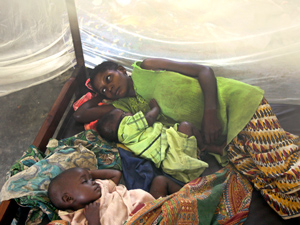
What's your opinion on this article?

In this photo taken through a mosquito net, two children with malaria rest with their mother at the local hospital in the small village of Walikale, Congo, Sept. 19, 2010. Violence was reaching new levels of savagery and spiraling out of control in this corner of Congo, where the competition for control of mineral resources has drawn in several armed groups, including the Congolese army. Rape has become a military strategy by the various groups of fighters to intimidate, punish and control the population in the mining areas. Photo: AP/Wide World photo
‘The deaths of six million Congolese should not be treated lightly. We feel that there are those in the international community that want the UN report forgotten and we are not going to let that happen.’ —Prof. Nii Akeutteh, a former executive director of Africa Action |
They also say while the world may want to forget the conflict and its victims, the lives lost are important and justice needs to be done. The United Nations hasn't done enough, said advocates who have appealed to members of the U.S. Congress as part of their ongoing campaign for justice.
Part of their appeal included a March 2 briefing on Capitol Hill that included discussion of a UN report that documented Oct. 1, 2010 serious violations of human rights in the Democratic Republic of the Congo. They charged Rwandan President Paul Kagame was complicit in some of the rights violations and urged lawmakers to stop U.S. support for the leader, saying American tax dollars should not be supporting atrocities in Africa.
“This congressional briefing can serve as a solid first step in delivering justice to the people in the heart of Africa,” said Jacques Bahati, a policy analyst with the Washington-based Africa Faith and Justice Network.
Many of the Senate and House staff members who attended the briefing represented freshman members of Congress, said Mr. Bahati. “It is important that we make contact now with these new members who are just settling into their committee positions to test their interests on the issues such as the Congo and the Great Lakes Region,” he said.
A congressional hearing on the UN report is one of the goals of the African/Great Lakes Advocacy Coalition which includes the Africa Faith & Justice Network, Friends of the Congo, Foreign Policy in Focus, the African Great Lakes Action Network, Congo Global Action Coalition and the International Law Institute of St. Paul.
“The very fact that the briefing was held on Capitol Hill, in and of itself, made the event a success,” said Maurice Carney, co-founder and executive director of Friends of the Congo. The UN has been suppressing reports on the atrocities in the Congo as far back as 1997, he charged.
Advocates said some 70 people attended the briefing.
“This latest report is very volatile, if you are on the other side of it,” Mr. Carney told The Final Call. When the Associated Press asked U.S. Ambassador Susan Rice to comment, she refused, he said.
“UN members should make a concerted international effort to initiate judicial investigations into grave human rights violations in the DRC,” said Human Rights Watch last October when the UN released the report.
“This detailed report is a powerful reminder of the scale of the crimes committed in Congo and the shocking absence of justice,” the human rights organization added.
The UN Office of the High Commissioner for Human Rights released the report that chronicled the most serious violations of human rights violations and international law committed within the DRC territory between March 1993 and June 2003.
Controversy about the report started when the French newspaper Le Monde was leaked a draft copy ahead of the official report. Some observers believe the leak happened because the UN was reluctant to release the report.
But a spokesman for the world body denied any controversy. “The report is out, end of the debate,” Vannina Maestracci, an African specialist in the UN press office, told The Final Call.
The document was a “mapping report” and was created to help strengthen the judiciary in the Congo, which was formerly known as Zimbabwe under the late longtime brutal dictator and U.S. ally Mobutu Sese Sekou.
The UN also had a responsibility to notify any nations accused of wrongdoing in the report, said the Africa specialist.
In this case, the governments of Rwanda, Uganda and Burundi, “their Congolese collaborators” and others were named. “The UN wanted to have all of the legal questions reviewed first,” Ms. Maestracci said.
Advocates want support for a report recommendation that an investigation determine whether the targeted and massive killing of Congolese citizens would be considered genocide.
The report looks back to 1993 during the regime of dictator Mobutu but the most damaging evidence was gathered against Rwanda after its 1997 invasion to help rebels unseat Mr. Mobutu, and in its 1998 efforts to unseat his successor Laurent Kabila. Rwanda was joined by armies from Uganda and Burundi as war raged in the mineral rich and timber rich nation.
Zimbabwe, Angola and Namibia joined with President Kabila to fend off Rwanda, Uganda and Burundi. All of the countries withdrew in 2002 after a cease-fire was brokered.
Advocates say, however, Washington continues to prop up the Rwandan regime under President Kagame and it should stop. “In President Barack Obama's 2011 budget more than $240 million is allocated to Rwanda. Since 2000, U.S. assistance to Rwanda is estimated at $1.03 billion,” they said.
“The deaths of six million Congolese should not be treated lightly,” said Prof. Nii Akeutteh, a former executive director of Africa Action who is now an independent Africa policy analyst and researcher. “We feel that there are those in the international community that want the UN report forgotten and we are not going to let that happen,” he vowed.